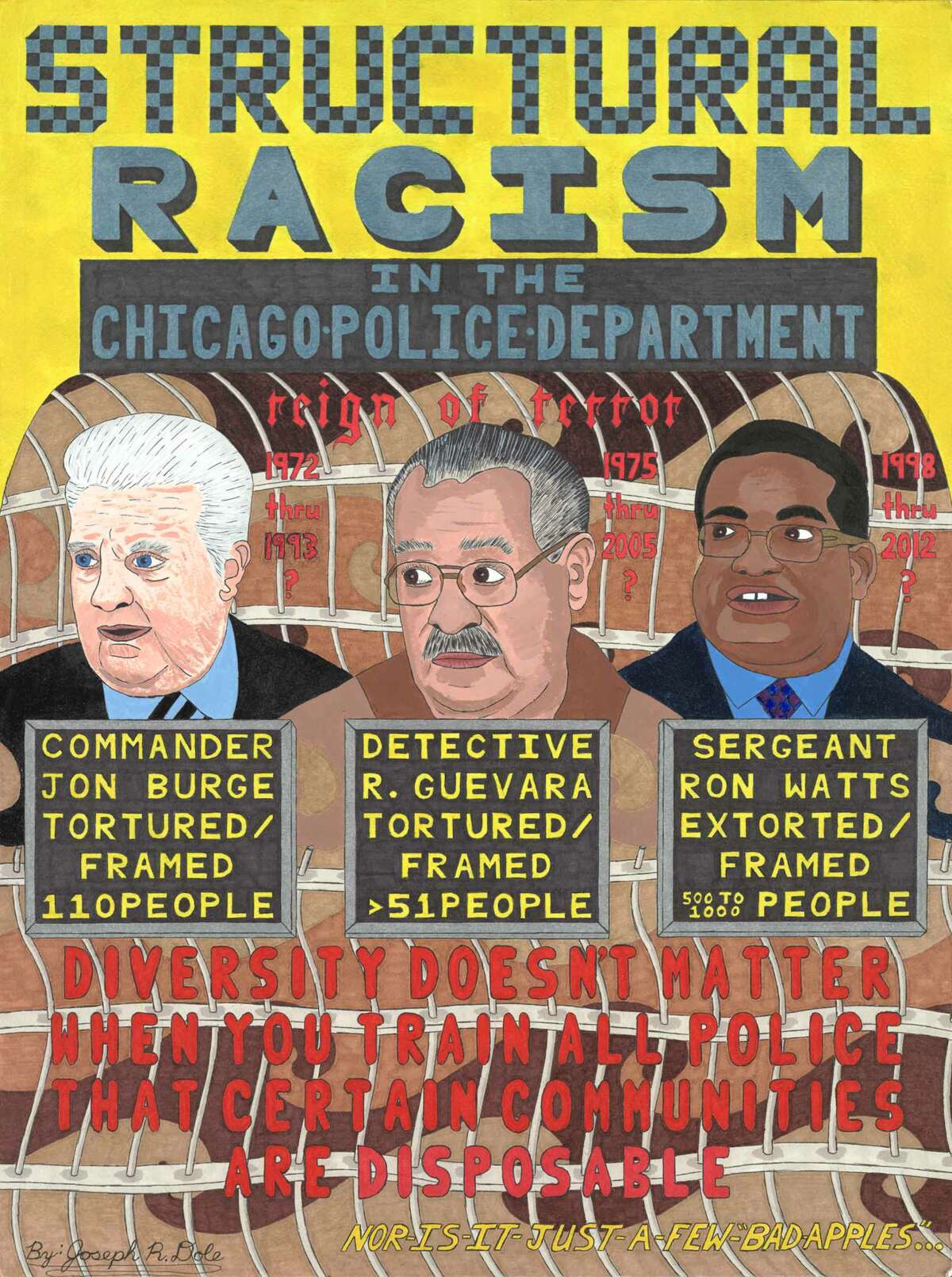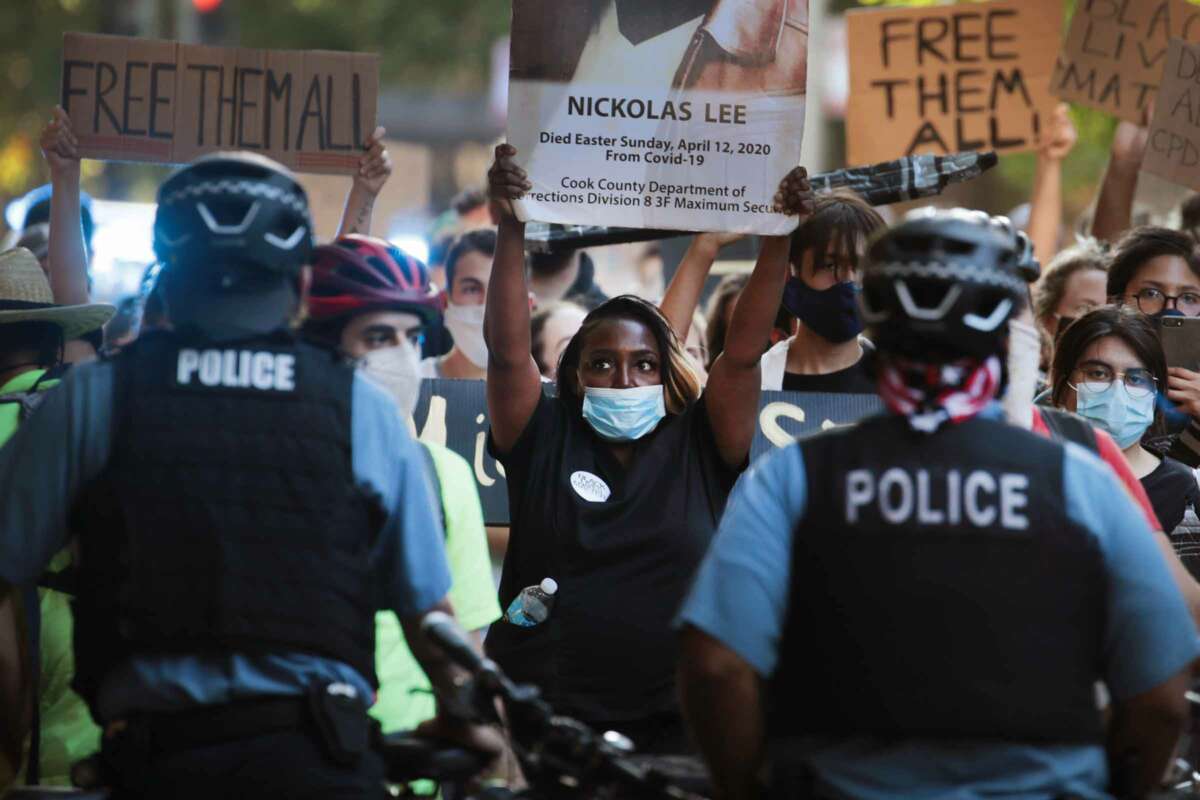Part of the Series
The Road to Abolition
Honest, paywall-free news is rare. Please support our boldly independent journalism with a donation of any size.
Every time a new wrongful conviction comes to light in Chicago, the Chicago Police Department (CPD) brass employ the same rote excuse: It is just a “few bad apples” causing these injustices. They claim that the vast majority of CPD members are good, honest people who diligently enforce the law. The backlash faced by the few CPD officers who have actually attempted to oppose these “bad apples,” however, clearly demonstrates the falsity of this narrative.
In Chicago, the “blue code of silence” is both real and pervasive. The fact that nearly every officer on the force will look the other way when they see their fellow officers violate citizens’ rights and commit other misconduct ensures that abuse and wrongful convictions will occur regularly. It also ensures that taxpayers will continue to be on the hook for the millions of dollars per year that the city of Chicago pays out in settlements and jury awards in civil suits — not just to victims of police misconduct, but also to those officers who suffer backlash for their attempts to report it.

Many of the biggest scandals to come out of the CPD over the past four decades have only been exposed because of internal whistleblowers. Frank Laverty was one such officer who tried to stand up to the “bad apples” around him. Laverty was a CPD detective who investigated the rape and murder of a young girl in the 1980s. His investigation concluded that the murderer was Lester Pique, which he reported to his supervisors.
When Laverty later learned that 18-year-old high school honor student George Jones was being tried for the crime, that the Cook County State’s Attorney’s Office was seeking the death penalty, and that his investigation reports had never been turned over to the defense, he informed defense counsel about the missing reports. When he told his superiors that he would testify on behalf of the defense, another detective threatened to shoot him. Laverty testified anyway, and defense counsel then sent a subpoena to the CPD. This revealed a separate “street file” where documents that the CPD created during the investigation were hidden away to keep them out of the hands of defense counsel.

More importantly, Laverty’s testimony — and the response to the subpoena which corroborated it — exposed the fact that this was the normal practice of the CPD. It would later be revealed that there were entire filing cabinets full of similar files from other cases stashed away in the basement of Area 1 Police Headquarters at 51st & Wentworth, and in the boiler room of Area 5 Police Headquarters at Grand & Central.
Rather than rewarding Laverty for his honesty, and for preventing a wrongful conviction, the CPD instead retaliated against him. He was not only transferred out of the detective division, relegated to monitoring urine tests and ostracized within the CPD, but he was also written up on disciplinary charges for testifying on behalf of George Jones without first personally notifying the State’s Attorney’s Office. In the end, Laverty would have to file a civil suit against the City to protect himself, which ended up costing taxpayers over a million dollars to settle.
Taxpayers got off easy thanks to this one whistleblower, however, because had the State wrongfully convicted George Jones, taxpayers would have been out a lot more than the $800,000 Jones ended up getting for the denial of his due process rights. Especially if he had been wrongfully convicted and murdered by the State before it was discovered that he was innocent.
Two more whistleblowers who sought to oppose the corrupt and violent practices of their departments were Shannon Spalding and Daniel Echeverria. For two decades from the 1990s through 2012, Sergeant Ronald Watts and his tactical team terrorized the residents of the Ida B. Wells housing projects. Their modus operandi was to shake down drug dealers and extort innocent people by demanding $1,000. Those who refused to pay were arrested under false charges of drug possession after Watts and crew planted drugs on them.
Dozens of such convictions have been overturned so far, and potentially hundreds of other wrongful convictions remain unaddressed or have yet to be uncovered. The Watts saga is a prime example of why criminal investigations and arrests coming out of the CPD should be viewed with extreme skepticism. The Watts saga establishes beyond a shadow of a doubt that the CPD is morally corrupt at the highest levels and has been for decades.

The CPD has knowingly and habitually violated people’s constitutional rights for decades. While the saga of Jon Burge (who tortured dozens of people into falsely confessing) may have been the tip of the iceberg, and the saga of Reynaldo Guevara (who framed dozens of people for murders they didn’t commit) added clear evidence, the Watts saga puts the nail in the coffin of the City’s ad nauseam claim that it is just a “few bad apples.”
The higher-ups at the CPD were well aware of what Watts and crew were up to. Rather than crack down on them and uphold the law, they chose to cover it up and allowed it to continue.
The DEA and FBI began investigating after receiving repeated complaints from citizens that Watts and his crew were framing and extorting residents of the Ida B. Wells homes. Known as Operation Brass Tax, the investigation would last a decade and only result in one minor conviction against Watts and a single crew member after Watts tried to shake down an undercover FBI agent he thought was a drug courier. The federal investigation was repeatedly frustrated by both the CPD’s blue code of silence, and the fact that CPD brass were not only uncooperative, but actively impeding their efforts.
The federal investigators enlisted CPD officers Spalding and Echeverria to work undercover to try to build a case against Watts and crew. Following an internal leak within the CPD, the department brass quickly retaliated by exposing them as “rats,” endangering their safety and working to derail both of their careers within the department. The City of Chicago would later settle with the two officer-informants for $2 million after they filed suit. While the whistleblowers were run out of the CPD, several members of Watts’s crew and their supervisors remain on the force today.
In July 2022, a jury awarded Beth Svec, another “good apple,” $4.3 million because the CPD violated the Whistleblower Act by retaliating against her for reporting that two officers — Brandon Ternand and Robert Caulfield — were falsifying police reports. After she made her report to the Cook County State’s Attorney’s Office, and an investigation was started by the CPD Bureau of Internal Affairs, her supervisor Lieutenant Ed Wodnicki ordered her to stop cooperating with the investigation. She was then transferred to the midnight shift and harassed. She also lost wages and other benefits.
This type of retaliation is commonplace and acts as a warning to anyone in the CPD who wants to be a “good apple.” It puts all officers on notice that there are significant costs to being an honest cop and upholding the law. Thus, it should come as no surprise that in the majority of cases there are no “good apples” to stand up for the victims of police abuse and misconduct. Instead, what we see is a department full of bad apples who are more than willing to cover it up, or fabricate justifications for corruption.
A prime example of this is the 2014 murder of Laquan McDonald by former CPD Officer Jason Van Dyke. Not a single officer on the scene that night — and there were many — arrested Van Dyke, or even did so much as initiate an inquiry into Van Dyke’s unjustifiable murder of Laquan in the middle of the street. The only reason anyone even knows this occurred is because a diligent journalist sued to have the video footage released.
This not only exposed the fact that the CPD lied to the McDonald family after he was murdered, but also that no real investigation had been conducted. The ensuing outcry and federal investigation would also reveal that several others — CPD Officers Joseph Walsh, Thomas Gaffney and David March — had falsified numerous police reports in order to try to cover up the murder.
If only it were true that the majority of CPD officers and staff were actually good honest apples, the entire barrel wouldn’t be so rotten. Police would be arresting their fellow officers for breaking the law, and they wouldn’t be scared of doing so.
Instead, the CPD continues with business as usual, maintaining and enforcing a code of silence, intimidating employees into being complicit in the illegal and unethical actions of their coworkers and retaliating against the few good officers who uphold their oaths to the citizens of Chicago by exposing corruption. Until this changes, taxpayers will continue to pay millions of dollars out of their pockets, the wrongfully convicted will have years of their lives stolen and victims will be denied justice as cases remain unsolved.
At this point, the CPD’s culture ensures that it is beyond repair and will continue to pose a serious threat to the safety of the public. The billions of dollars per year Chicagoans spend on the CPD does little to nothing to prevent crime. At best, the department deals with the aftermath of crime, and at worst, it commits crimes against the citizenry, frames people for crimes they didn’t commit while the true culprits go free, and habitually covers up police misconduct — ensuring it will continue unabated.
Those tax dollars could be much better spent on community building, education and social programs that actually prevent crime. Right now, Chicagoans are too often paying for the police to victimize certain communities, and then paying again to compensate the victims of police violence and misconduct. It is time to start from scratch when it comes to the CPD. There is no salvaging it.
A terrifying moment. We appeal for your support.
In the last weeks, we have witnessed an authoritarian assault on communities in Minnesota and across the nation.
The need for truthful, grassroots reporting is urgent at this cataclysmic historical moment. Yet, Trump-aligned billionaires and other allies have taken over many legacy media outlets — the culmination of a decades-long campaign to place control of the narrative into the hands of the political right.
We refuse to let Trump’s blatant propaganda machine go unchecked. Untethered to corporate ownership or advertisers, Truthout remains fearless in our reporting and our determination to use journalism as a tool for justice.
But we need your help just to fund our basic expenses. Over 80 percent of Truthout’s funding comes from small individual donations from our community of readers, and over a third of our total budget is supported by recurring monthly donors.
Truthout has launched a fundraiser to add 500 new monthly donors in the next 9 days. Whether you can make a small monthly donation or a larger one-time gift, Truthout only works with your support.
